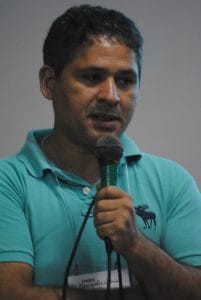
Feb 21, 2018 | Focolare Worldwide
 Guaramiranga, with 7,000 inhabitants, is a small city of the Northeastern state of Ceará in Brazil, which boasts a highly diversified natural environment at the Atlantic coast where there are also the most beautiful beaches in the world, and with an interior full of lagoons, and water courses populated by mangroves, jungles and forests. About 100 kilometers from the coast, it is the seat of two important cultural events: the international “Jazz and Blues” and the more local “Northeastern Theatre Festival.” Here lives Almir, a “volunteer of God” of the Focolare Movement. Some years ago, pushed by the desire to do something for his city, he decided to run for the post of Town Councilor. After his election he was asked to assume the councillorship for Culture and Tourism, an important role since most of the city’s economy rotates around tourism, cultural events and exhibitions. The role is very challenging and above all, Almir is full of ideas. However, it was not an easy choice: “I lengthily pondered on the mayor’s request to assume this position. In fact I was thinking of running again, since after a year and a half there would be a reshuffling of the town council, and I doubted that the proposal aimed at limiting me politically, due to my ideas in advocating clarity and transparency. On the other hand, the area of culture and tourism was undergoing a difficult moment: many small hotels and shops were about to close and the personnel would have been fired. I felt the suffering of those brothers who could have lost their jobs, and of the owners who would have had to close ship. So after talking with some friends, I accepted the challenge.” Almir started to work on the new assignment with passion, mobilising the entrepreneurs and inhabitants. He launched a participation course with some citizens, involving them in the promotion of touristic events to give a new impulse to the city and boost the economy’s upturn. Also the inhabitants of the rural districts were involved in a project for the upholding of local traditions with new cultural initiatives in the territory. In short, the city saw the growth of touristic flows, the birth of new businesses, hotels and hostels and the creation of new jobs. “Other two challenges” – Almir explained – “were the relaunching of the Town Theatre in the city’s historical centre, and the revival of the Food Court, the square dedicated to restaurants. In this case, the difficult rapports between the restaurant owners negatively influenced the events held in the city. I asked myself how we could go about creating relationships of fraternity and collaboration in that place. I started by going to visit them, creating friendly relations with each of them, and trying to understand the problems and smoothing out the tensions. At first I found a lot of resistance, but I didn’t give up. In the end, I was able to build a “team,” to such a point that today these people have become friends and cooperate with one another. It seemed like a miracle to see these businessmen, who were enemies at first, relate with each other in a friendly and supportive way.” «Today, due to family issues, I am no longer involved in the public administration, but I participate in the political life with the conviction that in trying to concretise the words of the Gospel, we can find the strength to meet the necessities of one’s people and one’s own community.” Chiara Favotti Source: Movimento dos Focolares Brasil (our translation)
Guaramiranga, with 7,000 inhabitants, is a small city of the Northeastern state of Ceará in Brazil, which boasts a highly diversified natural environment at the Atlantic coast where there are also the most beautiful beaches in the world, and with an interior full of lagoons, and water courses populated by mangroves, jungles and forests. About 100 kilometers from the coast, it is the seat of two important cultural events: the international “Jazz and Blues” and the more local “Northeastern Theatre Festival.” Here lives Almir, a “volunteer of God” of the Focolare Movement. Some years ago, pushed by the desire to do something for his city, he decided to run for the post of Town Councilor. After his election he was asked to assume the councillorship for Culture and Tourism, an important role since most of the city’s economy rotates around tourism, cultural events and exhibitions. The role is very challenging and above all, Almir is full of ideas. However, it was not an easy choice: “I lengthily pondered on the mayor’s request to assume this position. In fact I was thinking of running again, since after a year and a half there would be a reshuffling of the town council, and I doubted that the proposal aimed at limiting me politically, due to my ideas in advocating clarity and transparency. On the other hand, the area of culture and tourism was undergoing a difficult moment: many small hotels and shops were about to close and the personnel would have been fired. I felt the suffering of those brothers who could have lost their jobs, and of the owners who would have had to close ship. So after talking with some friends, I accepted the challenge.” Almir started to work on the new assignment with passion, mobilising the entrepreneurs and inhabitants. He launched a participation course with some citizens, involving them in the promotion of touristic events to give a new impulse to the city and boost the economy’s upturn. Also the inhabitants of the rural districts were involved in a project for the upholding of local traditions with new cultural initiatives in the territory. In short, the city saw the growth of touristic flows, the birth of new businesses, hotels and hostels and the creation of new jobs. “Other two challenges” – Almir explained – “were the relaunching of the Town Theatre in the city’s historical centre, and the revival of the Food Court, the square dedicated to restaurants. In this case, the difficult rapports between the restaurant owners negatively influenced the events held in the city. I asked myself how we could go about creating relationships of fraternity and collaboration in that place. I started by going to visit them, creating friendly relations with each of them, and trying to understand the problems and smoothing out the tensions. At first I found a lot of resistance, but I didn’t give up. In the end, I was able to build a “team,” to such a point that today these people have become friends and cooperate with one another. It seemed like a miracle to see these businessmen, who were enemies at first, relate with each other in a friendly and supportive way.” «Today, due to family issues, I am no longer involved in the public administration, but I participate in the political life with the conviction that in trying to concretise the words of the Gospel, we can find the strength to meet the necessities of one’s people and one’s own community.” Chiara Favotti Source: Movimento dos Focolares Brasil (our translation)
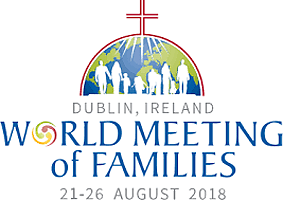
Feb 21, 2018 | Focolare Worldwide
 In preparation for the 9th World Meeting of Families, the Pontifical Council for the Laity, Family and Life has published seven catecheses which are available on its site in five languages (English, Spanish, French, Italian and Portuguese). The meeting will take place in Dublin from 20-26 August 2018. Card. Kevin Farrell, Prefect of the Council defined the catechesis as “A catechetical program in the light of what Pope Francis donated to the entire world with the post-synodal Apostolic Exhortation Amoris laetitia.” The themes to be presented are: “Families today,” “Families in the light of the Word of God,” “God’s great dream,” “The culture of life,” “The culture of hope” and “The culture of joy.” Card. Farrell explained: “Each catechesis is introduced by some prayers drawn from the pontifical magisterium or from patristic tradition, and concludes with the requests for a moment of sharing that starts from the family, the first domestic Church, to then extend to the Christian community.” The catecheses are accompanied by a musical itinerary sung by the renowned Italian singer, Andrea Bocelli, in a concert at the Sagrada Familia Basilica of Barcelona in May 2015, and is the first of a series of repeated concerts within the ambit of the project entitled “The Great Mystery. The Gospel of the Family, School of Humanity for Our Time,” and also in the shrine of St John Paul II in Cracow, and in the St. Stephen Basilica in Budapest. (www.laityfamilylife.va/)
In preparation for the 9th World Meeting of Families, the Pontifical Council for the Laity, Family and Life has published seven catecheses which are available on its site in five languages (English, Spanish, French, Italian and Portuguese). The meeting will take place in Dublin from 20-26 August 2018. Card. Kevin Farrell, Prefect of the Council defined the catechesis as “A catechetical program in the light of what Pope Francis donated to the entire world with the post-synodal Apostolic Exhortation Amoris laetitia.” The themes to be presented are: “Families today,” “Families in the light of the Word of God,” “God’s great dream,” “The culture of life,” “The culture of hope” and “The culture of joy.” Card. Farrell explained: “Each catechesis is introduced by some prayers drawn from the pontifical magisterium or from patristic tradition, and concludes with the requests for a moment of sharing that starts from the family, the first domestic Church, to then extend to the Christian community.” The catecheses are accompanied by a musical itinerary sung by the renowned Italian singer, Andrea Bocelli, in a concert at the Sagrada Familia Basilica of Barcelona in May 2015, and is the first of a series of repeated concerts within the ambit of the project entitled “The Great Mystery. The Gospel of the Family, School of Humanity for Our Time,” and also in the shrine of St John Paul II in Cracow, and in the St. Stephen Basilica in Budapest. (www.laityfamilylife.va/)
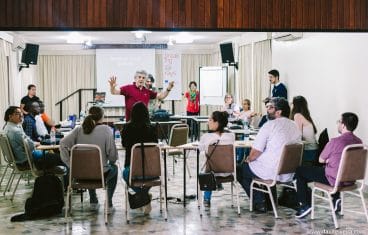
Feb 19, 2018 | Focolare Worldwide
 “Breaking Rays” is a play on the words “Breaking News” which are used to describe the interruption of some latest sensational news story. The sensational news this time was a project for the promotion of fraternity and a group of young communication workers who, with passion and skill, are stepping up to produce some maximum results. Breaking Rays aims at building an international network where experiences inspired by the charism of the Focolare Movement can come out of isolation and “break” onto the global scene, creating a widespread domino effect in other communities. Co-financed by the European Comission through the Erasmus+ and promoted by the international New Humanity Association in collaboration with CSC Audiovisual Centre, Italy, and other NGOs, the project is for young filmmakers and collaborators of the bi-monthly telephone CH Link-Up with news of the Focolare Community around the world. They already got through the first and second stages in Castelgandolfo, Italy, last July; and at Mariapolis Ginetta in San Paolo, Brazil on February 3-10. The next and final stage will take place concurrently with the Genfest, July 2018 in Manila, Philippines.
“Breaking Rays” is a play on the words “Breaking News” which are used to describe the interruption of some latest sensational news story. The sensational news this time was a project for the promotion of fraternity and a group of young communication workers who, with passion and skill, are stepping up to produce some maximum results. Breaking Rays aims at building an international network where experiences inspired by the charism of the Focolare Movement can come out of isolation and “break” onto the global scene, creating a widespread domino effect in other communities. Co-financed by the European Comission through the Erasmus+ and promoted by the international New Humanity Association in collaboration with CSC Audiovisual Centre, Italy, and other NGOs, the project is for young filmmakers and collaborators of the bi-monthly telephone CH Link-Up with news of the Focolare Community around the world. They already got through the first and second stages in Castelgandolfo, Italy, last July; and at Mariapolis Ginetta in San Paolo, Brazil on February 3-10. The next and final stage will take place concurrently with the Genfest, July 2018 in Manila, Philippines. 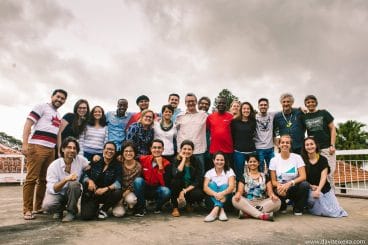 Twenty young people from different countries (Brazil, Italy Hungary, Indonesia, Philippines, India, Kenya and Burundi) have already arrived in Mariapolis Ginetta with a variety of skills, to be coordinated by professional tutors: Italian film director from RAI-TV, director of photography, Carlo Sgambato, project director, Kim Rowley from CSC audio-visuals, along with Isabela Reis, producer and curator of cultural audio-visual projects. With them there is also Paolo Cipollone from CSV Audiovisuals and coordinator of the project. Theoretical and practical training, along with experimenting with new techniques will alternate with work and a common life that will support a communion of talents and openness to constructive criticism. The group has made several visits to social projects of the region, making videos and interviewing. During other sessions, several experts in the field of communications (dreicting, television and radio journalism) have told their own experience and answered questions from the participants.
Twenty young people from different countries (Brazil, Italy Hungary, Indonesia, Philippines, India, Kenya and Burundi) have already arrived in Mariapolis Ginetta with a variety of skills, to be coordinated by professional tutors: Italian film director from RAI-TV, director of photography, Carlo Sgambato, project director, Kim Rowley from CSC audio-visuals, along with Isabela Reis, producer and curator of cultural audio-visual projects. With them there is also Paolo Cipollone from CSV Audiovisuals and coordinator of the project. Theoretical and practical training, along with experimenting with new techniques will alternate with work and a common life that will support a communion of talents and openness to constructive criticism. The group has made several visits to social projects of the region, making videos and interviewing. During other sessions, several experts in the field of communications (dreicting, television and radio journalism) have told their own experience and answered questions from the participants.  A unique experience in which to learn and go deeper into the profession of a journalist from a new perspective,” said Lewis from Burundi. “More than a course on film-making, powerful stories shared about how to make a better world,” said Donald from India. The team and experts helped me to develop an eye for detail and how to shatter stereotypes and cultural cliches, using audiovisuals.” Full-time tutor Isabela Reis from Brazil explains: “I think it’s a project we can be proud of. It was a strong experience that engaged us for eight days. It was useful for improving the ability to communicate among the young people. It was also important to discuss the various ways of taking advantage of the possibilities offered by technology.” Rafael from Brazil has been in Manila for several months helping to prepare the Genfest: “An important step towards Manila. It was beautiful to spend a whole week in contact with such incredible professionals. Their videos spread hope.” Kyle Venturillo from the Philippines: “We come from different parts of the world. We have different languages, cultures and personalities. In spite of this, we were able to establish a relationship of openness among us, which turned us into a family. We’re a group of people “a bit folly,” with different thoughts and perspectives, but with one main objective: to make this world more united.” Other participants in the project included: Starkmacher, Germany, Opus Mariae, Kenya, Focolare Ireland,, UJ Varos, Hungary, Pag-asa, Philippines, Civitas, Brazil, Focolare Society Bombay, India and YayasanDuniaBersatu, Indonesia. Chiara Favotti
A unique experience in which to learn and go deeper into the profession of a journalist from a new perspective,” said Lewis from Burundi. “More than a course on film-making, powerful stories shared about how to make a better world,” said Donald from India. The team and experts helped me to develop an eye for detail and how to shatter stereotypes and cultural cliches, using audiovisuals.” Full-time tutor Isabela Reis from Brazil explains: “I think it’s a project we can be proud of. It was a strong experience that engaged us for eight days. It was useful for improving the ability to communicate among the young people. It was also important to discuss the various ways of taking advantage of the possibilities offered by technology.” Rafael from Brazil has been in Manila for several months helping to prepare the Genfest: “An important step towards Manila. It was beautiful to spend a whole week in contact with such incredible professionals. Their videos spread hope.” Kyle Venturillo from the Philippines: “We come from different parts of the world. We have different languages, cultures and personalities. In spite of this, we were able to establish a relationship of openness among us, which turned us into a family. We’re a group of people “a bit folly,” with different thoughts and perspectives, but with one main objective: to make this world more united.” Other participants in the project included: Starkmacher, Germany, Opus Mariae, Kenya, Focolare Ireland,, UJ Varos, Hungary, Pag-asa, Philippines, Civitas, Brazil, Focolare Society Bombay, India and YayasanDuniaBersatu, Indonesia. Chiara Favotti
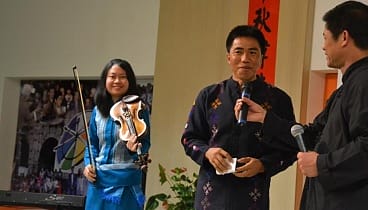
Feb 16, 2018 | Focolare Worldwide
 The Spring festival (春節, 春节, chūnjié) or lunar new year (農曆新年, 农历新年, nónglì xīnnián), known in the West as Chinese New Year, is one of the most important and most heartfelt Chinese traditional feast, wherein the new year is celebrated according to the Chinese lunar calendar. The celebrations will start on 16 February and continue for about two weeks up to the Lantern Festival, with numerous activities, shows and markets. On the eve, the families convene for the “dinner gathering,” the most important meal of the year. On this occasion, various generations hang out at round tables to savour food and time together. Every street, house or building is decorated in red, the festival’s main colour. Praying together in a temple during the New Year is believed to be a wish for good fortune for the new year that is about to start. In Shanghai thousands of people crowd in the Longhua Temple, the city’s biggest temple. In Loppiano, the international town of the Focolare where many inhabitants come from the Far East, there will be celebrations for the start of the year of the Dog with a party on Saturday, 17 February, which will be an occasion to delve into the cultures of Asia through games, art, music and dance.
The Spring festival (春節, 春节, chūnjié) or lunar new year (農曆新年, 农历新年, nónglì xīnnián), known in the West as Chinese New Year, is one of the most important and most heartfelt Chinese traditional feast, wherein the new year is celebrated according to the Chinese lunar calendar. The celebrations will start on 16 February and continue for about two weeks up to the Lantern Festival, with numerous activities, shows and markets. On the eve, the families convene for the “dinner gathering,” the most important meal of the year. On this occasion, various generations hang out at round tables to savour food and time together. Every street, house or building is decorated in red, the festival’s main colour. Praying together in a temple during the New Year is believed to be a wish for good fortune for the new year that is about to start. In Shanghai thousands of people crowd in the Longhua Temple, the city’s biggest temple. In Loppiano, the international town of the Focolare where many inhabitants come from the Far East, there will be celebrations for the start of the year of the Dog with a party on Saturday, 17 February, which will be an occasion to delve into the cultures of Asia through games, art, music and dance.
Feb 16, 2018 | Focolare Worldwide
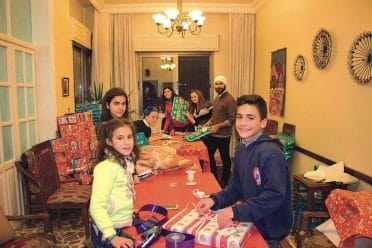
Feb 14, 2018 | Focolare Worldwide
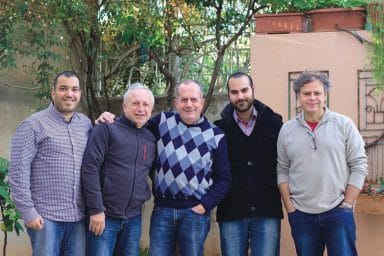
Robert Chelhod (centre) with the focolarini in Aleppo
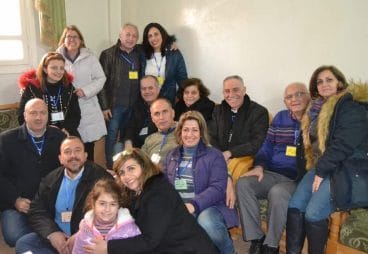 What can we do for Syria today? “For those who have faith, continue to pray. And you can bet with the Syrians that the country is alive. We need support in Syria. Not only from the economic point of view, which is certainly vital, but in believing that with us, this country, the cradle of civilisation, can be reborn. That peace is still possible. We need to know that the world feels our suffering, that of a country that is disappearing.” You coordinate onsite the social projects funded through AMU. How does this come about? “The projects range from aid for food to schooling. Then there is healthcare aid since public healthcare is unable to meet the minimum standards of assistance due to the lack of doctors, medicines and instruments. Besides help for families, there are more stable projects: two after-school organisations in Damascus and Homs with 100 children each, Christians and Muslims; two specific healthcare projects for the treatment of cancer and for dialysis; and a school for the deaf and dumb children, that was already operating before the war. These projects offer the possibility of work for many local youths. The employment issue is fundamental. We are dreaming in the near future of the possibility of working on microcredit to relaunch the activities. Aleppo was a city brimming with merchants who today would restart, but the initial capital is lacking.”
What can we do for Syria today? “For those who have faith, continue to pray. And you can bet with the Syrians that the country is alive. We need support in Syria. Not only from the economic point of view, which is certainly vital, but in believing that with us, this country, the cradle of civilisation, can be reborn. That peace is still possible. We need to know that the world feels our suffering, that of a country that is disappearing.” You coordinate onsite the social projects funded through AMU. How does this come about? “The projects range from aid for food to schooling. Then there is healthcare aid since public healthcare is unable to meet the minimum standards of assistance due to the lack of doctors, medicines and instruments. Besides help for families, there are more stable projects: two after-school organisations in Damascus and Homs with 100 children each, Christians and Muslims; two specific healthcare projects for the treatment of cancer and for dialysis; and a school for the deaf and dumb children, that was already operating before the war. These projects offer the possibility of work for many local youths. The employment issue is fundamental. We are dreaming in the near future of the possibility of working on microcredit to relaunch the activities. Aleppo was a city brimming with merchants who today would restart, but the initial capital is lacking.”  Instead many continue to leave… “The exodus, especially of the Christians, is irreversible. The reason is the insecurity, and lack of jobs. The Church suffers in this land which was a land of Christians before the arrival of Islam. And it is trying to do what is possible to help and support all this. But there are few resources. Most of the youths are in the army. You may find some university students, or kids. But the 25-40 age bracket is inexistent. In the city of Aleppo, the estimated further drop of Christians is 140,000 from 130,000, while many Muslims have arrived, evacuated from their destroyed cities.” What impact does this have on interreligious dialogue? “In Aleppo the Christians considered themselves somewhat like the élite of the country. With the war, since the Muslim zones were hit, many took refuge in the Christian zones. So the Christians opened out to the Muslims, and had to accept them. The Latin Bishop Emeritus of Aleppo, Bishop Armando Bortolaso, during the war told me: “Now’s the time to be real Christians.” At the same time the Muslims have got to know the Christians personally. They were touched by the concrete help. There are negative and positive aspects. The positive one is that this war has made us Syrians closer with one another.” Source: Citta’ Nuova Magazine
Instead many continue to leave… “The exodus, especially of the Christians, is irreversible. The reason is the insecurity, and lack of jobs. The Church suffers in this land which was a land of Christians before the arrival of Islam. And it is trying to do what is possible to help and support all this. But there are few resources. Most of the youths are in the army. You may find some university students, or kids. But the 25-40 age bracket is inexistent. In the city of Aleppo, the estimated further drop of Christians is 140,000 from 130,000, while many Muslims have arrived, evacuated from their destroyed cities.” What impact does this have on interreligious dialogue? “In Aleppo the Christians considered themselves somewhat like the élite of the country. With the war, since the Muslim zones were hit, many took refuge in the Christian zones. So the Christians opened out to the Muslims, and had to accept them. The Latin Bishop Emeritus of Aleppo, Bishop Armando Bortolaso, during the war told me: “Now’s the time to be real Christians.” At the same time the Muslims have got to know the Christians personally. They were touched by the concrete help. There are negative and positive aspects. The positive one is that this war has made us Syrians closer with one another.” Source: Citta’ Nuova Magazine

 Guaramiranga, with 7,000 inhabitants, is a small city of the Northeastern state of Ceará in Brazil, which boasts a highly diversified natural environment at the Atlantic coast where there are also the most beautiful beaches in the world, and with an interior full of lagoons, and water courses populated by mangroves, jungles and forests. About 100 kilometers from the coast, it is the seat of two important cultural events: the international “Jazz and Blues” and the more local “Northeastern Theatre Festival.” Here lives Almir, a “volunteer of God” of the Focolare Movement. Some years ago, pushed by the desire to do something for his city, he decided to run for the post of Town Councilor. After his election he was asked to assume the councillorship for Culture and Tourism, an important role since most of the city’s economy rotates around tourism, cultural events and exhibitions. The role is very challenging and above all, Almir is full of ideas. However, it was not an easy choice: “I lengthily pondered on the mayor’s request to assume this position. In fact I was thinking of running again, since after a year and a half there would be a reshuffling of the town council, and I doubted that the proposal aimed at limiting me politically, due to my ideas in advocating clarity and transparency. On the other hand, the area of culture and tourism was undergoing a difficult moment: many small hotels and shops were about to close and the personnel would have been fired. I felt the suffering of those brothers who could have lost their jobs, and of the owners who would have had to close ship. So after talking with some friends, I accepted the challenge.” Almir started to work on the new assignment with passion, mobilising the entrepreneurs and inhabitants. He launched a participation course with some citizens, involving them in the promotion of touristic events to give a new impulse to the city and boost the economy’s upturn. Also the inhabitants of the rural districts were involved in a project for the upholding of local traditions with new cultural initiatives in the territory. In short, the city saw the growth of touristic flows, the birth of new businesses, hotels and hostels and the creation of new jobs. “Other two challenges” – Almir explained – “were the relaunching of the Town Theatre in the city’s historical centre, and the revival of the Food Court, the square dedicated to restaurants. In this case, the difficult rapports between the restaurant owners negatively influenced the events held in the city. I asked myself how we could go about creating relationships of fraternity and collaboration in that place. I started by going to visit them, creating friendly relations with each of them, and trying to understand the problems and smoothing out the tensions. At first I found a lot of resistance, but I didn’t give up. In the end, I was able to build a “team,” to such a point that today these people have become friends and cooperate with one another. It seemed like a miracle to see these businessmen, who were enemies at first, relate with each other in a friendly and supportive way.” «Today, due to family issues, I am no longer involved in the public administration, but I participate in the political life with the conviction that in trying to concretise the words of the Gospel, we can find the strength to meet the necessities of one’s people and one’s own community.” Chiara Favotti Source: Movimento dos Focolares Brasil (our translation)
Guaramiranga, with 7,000 inhabitants, is a small city of the Northeastern state of Ceará in Brazil, which boasts a highly diversified natural environment at the Atlantic coast where there are also the most beautiful beaches in the world, and with an interior full of lagoons, and water courses populated by mangroves, jungles and forests. About 100 kilometers from the coast, it is the seat of two important cultural events: the international “Jazz and Blues” and the more local “Northeastern Theatre Festival.” Here lives Almir, a “volunteer of God” of the Focolare Movement. Some years ago, pushed by the desire to do something for his city, he decided to run for the post of Town Councilor. After his election he was asked to assume the councillorship for Culture and Tourism, an important role since most of the city’s economy rotates around tourism, cultural events and exhibitions. The role is very challenging and above all, Almir is full of ideas. However, it was not an easy choice: “I lengthily pondered on the mayor’s request to assume this position. In fact I was thinking of running again, since after a year and a half there would be a reshuffling of the town council, and I doubted that the proposal aimed at limiting me politically, due to my ideas in advocating clarity and transparency. On the other hand, the area of culture and tourism was undergoing a difficult moment: many small hotels and shops were about to close and the personnel would have been fired. I felt the suffering of those brothers who could have lost their jobs, and of the owners who would have had to close ship. So after talking with some friends, I accepted the challenge.” Almir started to work on the new assignment with passion, mobilising the entrepreneurs and inhabitants. He launched a participation course with some citizens, involving them in the promotion of touristic events to give a new impulse to the city and boost the economy’s upturn. Also the inhabitants of the rural districts were involved in a project for the upholding of local traditions with new cultural initiatives in the territory. In short, the city saw the growth of touristic flows, the birth of new businesses, hotels and hostels and the creation of new jobs. “Other two challenges” – Almir explained – “were the relaunching of the Town Theatre in the city’s historical centre, and the revival of the Food Court, the square dedicated to restaurants. In this case, the difficult rapports between the restaurant owners negatively influenced the events held in the city. I asked myself how we could go about creating relationships of fraternity and collaboration in that place. I started by going to visit them, creating friendly relations with each of them, and trying to understand the problems and smoothing out the tensions. At first I found a lot of resistance, but I didn’t give up. In the end, I was able to build a “team,” to such a point that today these people have become friends and cooperate with one another. It seemed like a miracle to see these businessmen, who were enemies at first, relate with each other in a friendly and supportive way.” «Today, due to family issues, I am no longer involved in the public administration, but I participate in the political life with the conviction that in trying to concretise the words of the Gospel, we can find the strength to meet the necessities of one’s people and one’s own community.” Chiara Favotti Source: Movimento dos Focolares Brasil (our translation)


 “Breaking Rays” is a play on the words “Breaking News” which are used to describe the interruption of some latest sensational news story. The sensational news this time was a project for the promotion of fraternity and a group of young communication workers who, with passion and skill, are stepping up to produce some maximum results. Breaking Rays aims at building an international network where experiences inspired by the charism of the Focolare Movement can come out of isolation and “break” onto the global scene, creating a widespread domino effect in other communities. Co-financed by the European Comission through the Erasmus+ and promoted by the international
“Breaking Rays” is a play on the words “Breaking News” which are used to describe the interruption of some latest sensational news story. The sensational news this time was a project for the promotion of fraternity and a group of young communication workers who, with passion and skill, are stepping up to produce some maximum results. Breaking Rays aims at building an international network where experiences inspired by the charism of the Focolare Movement can come out of isolation and “break” onto the global scene, creating a widespread domino effect in other communities. Co-financed by the European Comission through the Erasmus+ and promoted by the international 



 What can we do for Syria today? “For those who have faith, continue to pray. And you can bet with the Syrians that the country is alive. We need support in Syria. Not only from the economic point of view, which is certainly vital, but in believing that with us, this country, the cradle of civilisation, can be reborn. That peace is still possible. We need to know that the world feels our suffering, that of a country that is disappearing.” You coordinate onsite the social projects funded through
What can we do for Syria today? “For those who have faith, continue to pray. And you can bet with the Syrians that the country is alive. We need support in Syria. Not only from the economic point of view, which is certainly vital, but in believing that with us, this country, the cradle of civilisation, can be reborn. That peace is still possible. We need to know that the world feels our suffering, that of a country that is disappearing.” You coordinate onsite the social projects funded through